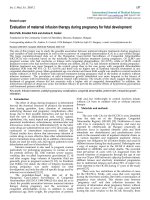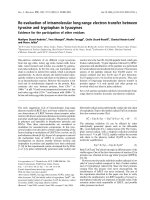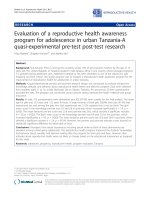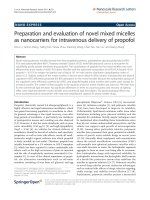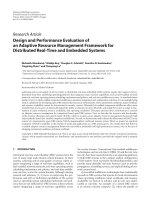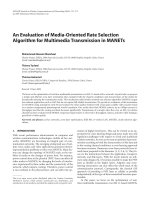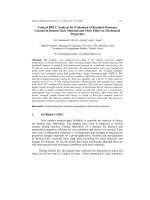Evaluation of Gladiolus (Gladiolus hybridus Hort.) varieties for vegetative and floral characters under Bundelkhand conditions
Bạn đang xem bản rút gọn của tài liệu. Xem và tải ngay bản đầy đủ của tài liệu tại đây (245.17 KB, 8 trang )
Int.J.Curr.Microbiol.App.Sci (2020) 9(5): 2612-2619
International Journal of Current Microbiology and Applied Sciences
ISSN: 2319-7706 Volume 9 Number 5 (2020)
Journal homepage:
Original Research Article
/>
Evaluation of Gladiolus (Gladiolus hybridus Hort.) Varieties for Vegetative
and Floral Characters under Bundelkhand Conditions
Ajay Kumar Singh1*, Rakesh Kumar1, K. S. Tomar1, Hitesh Kumar2,
Sanjeev Kumar3 and Amit Kumar2
1
Department of Floriculture and Landscape Architecture, College of Horticulture,
Department of Genetics and Plant Breeding, College of Agriculture, 3Department of
Silviculture and Agroforestry, College of Forestry, Banda University of Agriculture and
Technology, Banda Uttar Pradesh-210001, India
2
*Corresponding author
ABSTRACT
Keywords
Evaluation,
Gladiolus, Spike,
Rachis, Floret, Vase
life
Article Info
Accepted:
18 April 2020
Available Online:
10 May 2020
Fourteen varieties of gladiolus (Gladiolus hybridus Hort.) were evaluated for various
vegetative and floral paramenters under Bundelkhand conditions of Uttar Pradesh during
the years 2017-18 and 2018-19. Minimum days to spike initiation were recorded in variety
Jester (90.50 days) and variety White Prosperity took maximum days (108.05 days) for
spike initiation. Plant height and spike length was recorded maximum in variety White
Prosperity (124.25 cm and 110.65 cm) however, minimum plant height was recorded in
variety Punjab Morning (84.22 cm), and minimum spike length was observed in variety
Red White (65.07 cm). Maximum duration of flowering was exhibited by variety Willas
Pink (18.61 days). However, minimum duration of flowering (13.28 days) was recorded in
variety Peter Pears. Number of florets per spike was found maximum in cv. Willas Pink
(19.95) and minimum number of florets per spike was found in cv. Red White (10.56).
Maximum floret size was recorded by Willas Pink (9.66 cm) and minimum floret size was
recorded in White prosperity (8.27 cm). Maximum vase life was recorded in cv. Black Star
(10.22 days) and minimum in White Prosperity (6.95 days).
Introduction
Bulbous plants constitute one of the most
important groups of plants grown for their
floral wealth (Kumar et al., 2011a). Among
bulbous
crops,
gladiolus
(Gladiolus
grandiflorus Hort.), generally called glad
(plural gladioli, gladioluses, glads) occupies a
prime position among commercial cut flower
crops due to high demand in both domestic
and international markets. It is called queen of
bulbous flowers for its excellent aesthetic
value and display life (Bhattacharjee and De,
2005).
It is also known as the Sword Lily or Corn
Lily. It belongs to family iridaceae. Its
fascinating spikes with variety of colours has
2612
Int.J.Curr.Microbiol.App.Sci (2020) 9(5): 2612-2619
made it attractive for use in as cut flower,
making bouquets, indoor decoration and in
landscaping as herbaceous borders, bedding
plant, in rockeries and pots.
Evaluation is the first important step in any
crop improvement programme. It is the basic
tool for assessing the genetic variability
present in any crop species, which could be
exploited for its commercialization. The
purpose of evaluation is to ascertain its
suitability to climate and soil of that particular
area. So a particular crop and its varieties
should be evaluated in a particular region
before recommending to the farmers for
cultivation on commercial level. In
Bundelkhand region, no or very little work is
done on gladiolus crop. As there is always a
demand for novel types having attractive
colours, uniform opening of florets, more
number of florets per spike and more vase life
along with high spike and corm yield. In view
of this, a trial was conducted to evaluate the
performance of various gladiolus varieties for
morphological characters in bundelkhand
region.
of 30 x 20 cm. The recommended dose of
fertilizer consisting of 30g N, 20g P2O5 and
20g K2O per m2 was applied in form of urea,
single super phosphate and muriate of Potash,
respectively. The P and K dose was applied in
the beds one week before planting as per the
treatment combination. Nitrogen was applied
in two equal split doses. The first half dose
was applied at 3-leaf stage and second half
dose was applied at 6-leaf stage. All the
recommended cultural operations i.e.,
irrigation, hoeing, weeding, spraying and
fertilizer application was given in time during
the entire crop period for obtaining better
quality spikes along with high yield.
Observations were recorded in five randomly
selected plants in each treatment for various
vegetative and floral parameters. The data
were recorded for days taken to spike
initiation, days taken to flowering, plant
height (cm), spike length (cm), rachis length
(cm), duration of flowering (days), number of
florets open at one time, floret size (cm) and
vase life (days). The mean value of the data
observed was taken to represent a particular
genotype with respect to character.
Materials and Methods
Results and Discussion
The present experiment was carried out at
Experimental farm of Department of
Floriculture
and
Landscape
Architecture,Banda University of Agriculture
and Technology, Banda, during 2017-18 and
2018-19.The experiment was laid out in a
randomized block design with fourteen
varieties as treatments with three replications.
Analysis of variance revealed significant
differences among the genotypes for most of
the traits studied (Table 1) indicating presence
of wider genetic variability, which can be
utilized for genetic improvement of desired
horticultural trait(s).
The varieties studied in the experiment were
Black Star, Peter Pears, Gold Star, Trader
Horn, Pink Rose, White Prosperity, Red
White, Novalux, Yellow Gold, Candyman,
Willas Pink, Jester, Nathan Red and Punjab
Morning. The corms were treated with
carbendazim (0.2%) before planting in field.
The corms were planted in beds at a spacing
The mean performance of gladiolus cultivars
varied considerably for vegetative and
flowering parameters (Table 2). The perusal
of data presented in revealed that minimum
days to spike initiation were recorded in Jester
(90.50 days) followed by Black Star (90.67
days), However, cv. White Prosperity took
maximum days (108.05 days) for spike
initiation followed by Pink Rose (106.17
days).
2613
Int.J.Curr.Microbiol.App.Sci (2020) 9(5): 2612-2619
Earliest flowering was exhibited by cv. Black
Star (105.00 days) followed by Jester (105.83
days) and cv. White Prosperity took
maximum days to flowering (119.75 days).
Late flowering was recorded in cultivar White
Prosperity (119.75 days) followed by Pink
Rose (117.67 days).
Variation in days taken to spike initiation and
flowering might be due to genetic makeup of
the cultivars, which might differ from cultivar
to cultivar. It might also depend on food
reserves in plant that could be related to
growth rate of plants regulating accumulation
of the requisite level of carbohydrates for
slipping. The results are in conformity with
the findings of Kadam et al., 2014 and
Chourasia et al., 2015 in gladiolus.
The plant height and spike length (124.25 cm
and 110.65 cm) was recorded maximum in cv.
White Prosperity followed by Trader Horn
(113.17 cm and 95.20 cm) and Willas
Pink(111.18 cm and 94.48 cm), respectively.
Whereas cv. Punjab Morning exhibited
minimum plant height and spike length was
recorded minimum in cv. Red white (65.07
cm). Cultivar Willas Pink exhibited maximum
rachis length (61.51 cm) followed by White
Prosperity (53.38 cm) and Black star (51.77
cm) and minimum rachis length (30.51 cm)
was found in cv. Red White followed by cv.
Punjab Morning (36.74 cm).
The variation in plant height, spike length and
rachis length in different varieties may be due
to influence of genetic and environmental
factors. As each variety has its own
characteristic genetic constitution, which
contributes significantly to create variability.
Similar observations for plant height, spike
length and rachis length also reported by
Mushtaq et al., 2018; Singh et al., 2017a and
Singh et al., 2017b in gladiolus and Kumar et
al., 2011b in snapdragon.
Duration of flowering was recorded
maximum in cv. Willas Pink (18.61 days) and
it is at par with cvs. Nathan Red (17.00 days),
Black Star (16.84 days), Jester (16.78 days),
Trader Horn (16.50 days), Yellow Gold
(16.28 days),White Prosperity (16.23 days)
and Gold Star (16.17 days). However,
minimum duration of flowering (13.28 days)
was found in cv. Peter Pears. The difference
in flowering duration among the varieties
might be due to difference in their genetic
makeup as well as influence of environment
and other management factors. Singh et al.,
2018 in gladiolus. Number of florets per spike
was found maximum in cv. Willas Pink
(19.95) followed by cv. Trader Horn (18.11)
and White Prosperity (17.64). However,
minimum number of florets per spike was
recorded in cv. Red White (10.56) followed
by Candyman (14.75). Number of florets
differs from cultivar to cultivars, this might be
due to hereditary traits of the cultivar of the
gladiolus, which is governed by genetic
makeup of the plants. Similar results on
number of florets per spike have been
reported by Rani and Singh (2005) in
gladiolus. Maximum floret size was recorded
by cv. Willas Pink (9.66 cm) and minimum
floret size was recorded in cv. White
prosperity (8.27 cm). Variation in floret size
among the varieties might be due to
differences in their genetic constitution.
Similar results were also advocated by
Pandey et al., 2012; Rani and Singh (2005);
Partap and Rao (2006) in gladiolus and
Kumari and Misra (2009) in snapdragon.
Cultivar Jester showed maximum number of
florets open at one time (7.61) followed by
Candyman (7.36). However, minimum
number of florets open at one time was found
in cv. Black Star (5.28) followed by Nathan
Red (5.34). This might be due to variation in
genetic constitution among the varieties,
which ultimately influences the number of
florets opened at one time.
2614
Int.J.Curr.Microbiol.App.Sci (2020) 9(5): 2612-2619
Table.1 Combined analysis of variance of 10 quantitative traits of fourteen genotypes of gladiolus (pooled data)
Source of variation
df
Mean sum of square
Days
taken to
spike
initiation
Days
taken to
flowering
Plant
height
(cm)
Spike
length
(cm)
Rachis
length
(cm)
Duration
of
flowering
No. of
florets
per
spike
Floret
size
(cm)
No. of
florets
open at
one time
Vase
life
(days)
Replication(Within En)
4
44.67
17.26
99.81
126.80
81.73
7.21*
4.98
0.87
0.78
0.46
Year
1
13.31
0.06
0.19
4.38
76.50
0.90
5.34
0.00
0.44
0.64
Genotypes
13
187.91***
148.69***
806.92***
985.72***
368.77***
14.90***
27.39***
1.69***
2.84***
7.59***
Genotypes x year
13
8.75
8.96
19.17
27.96
15.56
0.93
0.80
0.12
0.44
1.00
Pooled Error
52
23.04
12.74
107.64
103.34
34.64
2.81
2.75
0.37
0.68
0.93
* Indicates significance at P=.05., ** Indicates significance at P=.01., *** Indicates significance at P=.001
Table.2 Mean performances of 14 gladiolus genotypes for different morphological characters (pooled data)
Sr.
No.
Genotype
1.
2
3.
4.
5.
6.
7.
8.
9.
10.
11.
12.
13.
14.
Black Star
Peter Pears
Gold Star
Trader Horn
Pink Rose
White Prosperity
Red White
Novalux
Yellow Gold
Candyman
Willas Pink
Jester
Nathan Red
Punjab Morning
C.D. at 5%
Days taken
to spike
initiation
Days
taken to
flowering
90.67
95.22
95.61
93.17
106.17
108.05
92.84
94.27
93.56
95.22
103.86
90.50
95.50
92.84
7.23
105.00
110.39
109.28
106.34
117.67
119.75
107.23
107.61
107.17
106.22
116.69
105.83
108.39
106.17
5.29
Plant
height
(cm)
102.02
95.23
90.63
113.17
95.44
124.25
85.65
90.70
97.46
89.15
111.18
103.70
107.35
84.22
16.17
Spike
length
(cm)
80.10
72.77
75.15
95.20
80.14
110.65
65.07
73.01
74.75
70.48
94.48
81.94
89.97
66.08
15.69
Rachis
length
(cm)
51.77
40.15
40.32
50.92
47.15
53.38
30.51
39.67
42.07
43.81
61.51
46.61
47.51
36.74
9.16
2615
Duration
of
flowering
16.84
13.28
16.17
16.50
15.89
16.23
13.56
14.62
16.28
13.61
18.61
16.78
17.00
14.22
2.67
No. of
florets per
spike
17.06
14.78
16.34
18.11
17.14
17.64
10.56
15.56
16.95
14.75
19.95
16.39
17.34
16.45
2.39
Floret
size (cm)
No of florets
open at one
time
Vase life
(days)
9.09
8.28
8.36
9.43
8.31
8.27
8.95
9.09
9.13
9.50
9.66
9.51
9.41
8.35
0.94
5.28
6.17
6.50
5.61
6.51
6.17
5.61
6.45
6.61
7.36
6.56
7.61
5.34
6.61
1.17
10.22
9.89
10.05
8.89
8.11
6.95
10.06
7.11
9.89
8.33
8.22
9.39
8.28
9.94
1.23
Int.J.Curr.Microbiol.App.Sci (2020) 9(5): 2612-2619
Table.3 Pairwise mean comparison of important traits of the 14 genotypes of gladiolus (pooled data)
S.
Varieties
No.
Black Star
1
DSI
DTF
PH
SL
RL
DoF
90.61c
105.00c
102.02bcde
80.10bcd
51.77abc
16.83abc
2
Peter Pears
95.22bc
110.39bc
95.23bcde
72.77cd
40.14cdef
3
Gold Star
95.61bc
109.28c
90.63cde
75.15bcd
4
Trader Horn
93.16c
106.34c
113.17ab
5
Pink Rose
106.17a
117.67a
6
108.05a
7
White
Prosperity
Red White
8
NF/S
FS
NoFOT
VL
17.05ab 9.09ab
5.28b
10.22a
13.28d
14.78b
8.27b
6.17ab
9.89ab
40.32cdef
16.17abcd
16.33b
8.36b
6.50ab
10.05ab
95.20ab
50.91abcd
16.50abcd 18.11ab 9.43ab
5.61b
8.89abc
95.44bcde
80.13bcd
47.15bcde
15.89abcd 17.14ab
8.31b
6.50ab
8.11bc
119.75a
124.25a
110.65a
53.38ab
16.22abcd 17.64ab
8.27b
6.17ab
6.95c
92.84c
107.22c
85.65e
65.07d
30.50f
13.55cd
10.56c
8.94ab
5.61d
10.05ab
Novalux
94.22bc
107.61c
90.70cde
73.01cd
39.67def
14.61bcd
15.56b
9.10ab
6.45ab
7.11c
9
Yellow Gold
93.56c
107.17c
97.45bcde
74.75bcd
42.07bcdef 16.28abcd 16.94ab 9.13ab
6.61ab
9.89ab
10
Candyman
95.22bc
104.22c
89.15de
70.48cd
43.80bcde
13.61bcd
14.75b
9.49ab
7.36a
8.33abc
11
Willas Pink
103.86ab 116.69ab
111.18abc
94.48ab
61.51a
18.61a
19.95a
9.66a
6.56ab
8.22bc
12
Jester
90.56c
105.83c
103.69abcde
81.93bcd
46.61bcde
16.78abc
16.39b
9.51ab
7.61a
9.39ab
13
Nathan Red
95.50bc
108.39c
107.35abcd
89.97bc
47.51bcde
17.00ab
17.33ab 9.40ab
5.33b
8.28abc
14
Punjab
Morning
92.84c
106.17c
84.22e
66.08d
36.74ef
14.22bcd
16.45b
6.61ab
9.94ab
8.35b
DSI = Days taken to spike initiation; DTF = Days taken to flowering; PH = Plant height; SL= Spike length; RL=Rachis length; DoF = Duration of flowering;
NF/S = Number of florets per spike; FS = Floret size, NoFOT: Number of florets open at one time, VL=Vase life.
2616
Int.J.Curr.Microbiol.App.Sci (2020) 9(5): 2612-2619
Fig.1 Box plots depicting variations for a) Days taken to spike initiation b) Days taken to 50% flowering, c) Plant height,
d) Spike length e) Rachis Length f) Duration of flowering g) Number of florets per spike h) Floret size
i) Number of florets open at one-time j) Vase life
2617
Int.J.Curr.Microbiol.App.Sci (2020) 9(5): 2612-2619
The results are in conformity with the
findings of Singh et al., 2018 in gladiolus.
Vase life studies indicated that cv. Black Star
recorded maximum vase life (10.22 days)
followed by Red White (10.06 days), whereas
minimum vase life was recorded in White
Prosperity (6.95 days) followed by Novalux
(7.11 days).
The variation in vase life might be due to
senescing behaviour by producing higher
amount of ACC, ethylene forming enzyme
and ethylene along with genetic makeup of
different genotypes. It might also be due to
carbohydrates reserves of flowers, osmotic
concentration and pressure potential of petal
cells which is influenced by genetic
constitution. Vascular blockage might be
regarded as the major cause for wilting
leading to reduction in longevity of cut
flowers.
The findings are in line with the results
obtained by Jauhari and Singh (2006) in
snapdragon and Laxmi et al., (2008) in
chrysanthemum. The pair wise mean
comparison and basic descriptive statistics
parameters of all traits of the experiment are
presented in Table 3.
All genotypes are grouped for each trait using
pairwise mean comparison analysis. The
genotypes confirm distinct grouping pattern
for each trait, where genotype with unique
single letter are significantly different from
another genotype and means with the same
letter are not significantly different.The box
plots depicting variability for all the traits are
shown in Fig. 1.
Varieties White Prosperity, Traders Horn and
Willas Pink exhibited better plant height and
spike length and rachis length. Willas Pink
also recorded maximum flowering duration,
number of florets per spike and floret size. So,
on the basis of above findings, these varieties
can be recommended for cut flower purpose
to the farmers in this region.
References
Bhattacharjee, S. and L. C. De. 2005. Postharvest technology of flowers and
ornamental
plants.
Aavishkar
Publishers, Jaipur, India, 11-19.
Chourasia, A., Viradia, R.R., Ansar, H. and
Madle, S.N. (2015). Evaluation of
different gladiolus cultivars for growth,
flowering, spike yield and corm yield
under Saurashtra region of Gujarat. The
Bioscan, 10(1): 131-134.
Jauhari, S. and Singh, A.K. 2006. Evaluation
of inbred and their F1’s for flowering
and postharvest attributes in snapdragon
(Antirrhinum majus L.).Journal of
Ornamental Horticulture, 9 (2): 91-96.
Kadam, G.B., Kumar, G., Saha, T.N., Tiwari,
A.K. and Kumar, R. (2014). Varietal
evaluation and genetic variability
studies on gladiolus. Indian Journal of
Horticulture, 71(3): 379-384.
Kumar, R., Kumar, R. and Kumar, P. 2011a.
Effect of integrated use of chemical
fertilizers,
biofertilizers
and
biostimulants in gladiolus (Gladiolus
grandiflorus
L.)
cv.
Sancerre.
Progressive Horticulture, 43(1):149152.
Kumar, R., Kumar, S., Kumar, P. and Mer, R.
2011b. Comparative performance of
snapdragon (Antirrhinum majus L.)
genotypes under tarai conditions of
Uttarakhand. Journal of Scientific and
Applied Research. 2(2) :142-147.
Kumari, J. and Misra, K.K. 2009.
Morphological characterization and
evaluation of snapdragon genotypes for
cut flower and seed production purpose
under Tarai conditions of Uttarakhand.
Journal of Ornamental Horticulture,
12(1): 62-67.
Laxmi, P., Pratap, M. and Reddy, S.A. 2008.
2618
Int.J.Curr.Microbiol.App.Sci (2020) 9(5): 2612-2619
Evaluation
of
yellow
coloured
chrysanthemum
(Dendranthema
grandiflora L.) cultivars for growth,
flowering and yield. Orrisa Journal of
Horticulture, 36 (1): 116-119.
Mushtaq, S., Hafiz, I.A., Arif, M. and Anwar,
A. (2018). Performance evaluation of
elite gladiolus cultivars under agro
climatic conditions of Rawalpindi.
Asian Journal of Advances in
Agricultural Research, 5(3): 1-6.
Pandey, R.K., Bhat, D.J.I., Dogra, S., Singh,
A., Laishram, N. and Jamwal, S. (2012).
Evaluation of gladiolus cultivars under
subtropical conditions of Jammu.
International Journal of Agriculture
Sciences, 8(2): 518-522.
Pratap, M and Rao, A.M. 2006. Assessment
and variability studies in gladiolus.
Journal of Ornamental Horticulture, 9
(2): 145-147.
Rani, R. and Singh, C. (2005). Evaluation of
different gladiolus cultivars for quality
flower
production.
Journal
of
Researches
Birsa
Agriculture
University. 17(2): 227-230.
Singh, A. K., Sisodia, A., Sisodia, V. and
Ray, P. (2017a). Performance of Indian
and exotic varieties of gladiolus under
Eastern UP conditions. Journal of
Ornamental Horticulture, 20(3&4):
153-157.
Singh, A.K., Kumar, D., Sisodia, A. and
Padhi, M. 2018. Varietal Evaluation of
Gladiolus for Flowering Attributes
Under
Indo-Gangetic
Plains.
International Journal of Current
Microbiology
and
Applied
Sciences,7(07): 3728-3735.
Singh, D., Mishra, A.,Singh, J. and Meena, B.
(2017b) Evaluation of Morphological
Characters of Gladiolus (Gladiolus
hybridus Hort.) Genotypes under Sub
Humid Condition of Rajasthan.
International Journal of Agriculture
Sciences, 9(7): 3846-3848.
How to cite this article:
Ajay Kumar Singh, Rakesh Kumar, K. S. Tomar, Hitesh Kumar, Sanjeev Kumar and Amit
Kumar. 2020. Evaluation of Gladiolus (Gladiolus hybridus Hort.) Varieties for Vegetative and
Floral Characters under Bundelkhand Conditions. Int.J.Curr.Microbiol.App.Sci. 9(05): 26122619. doi: />
2619
